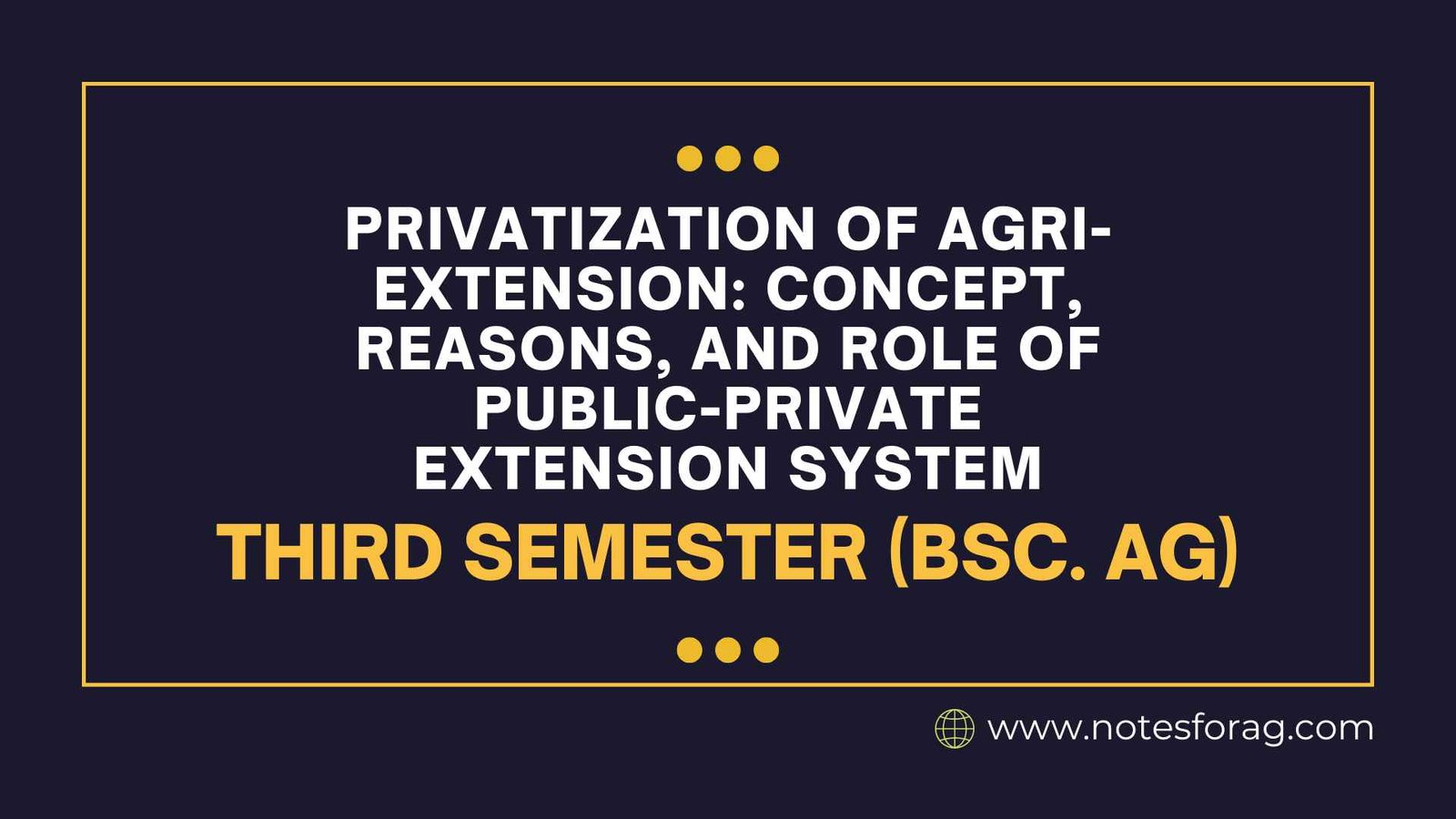Privatization of agri-extension entails shifting agricultural advising services from government control to private enterprises with the goal of increasing efficiency, innovation, and market responsiveness. This transition is motivated by limited public resources, a demand for specialized knowledge, and a need for more accountable and personalized services. In a public-private extension system, collaboration between the government and commercial sectors guarantees that all farmers, particularly those in underserved areas, receive excellent assistance while balancing profitability with broader agricultural development goals.
Table of Contents
Concept of Privatization of Agri-Extension
Privatization of Agri-Extension refers to the transfer of agricultural extension services from government organizations to private entities. This can include private corporations, non-governmental organizations (NGOs), farmer cooperatives, and other non-state entities. The concept is to incorporate the private sector in providing agricultural advice, training, and support to farmers, with the goal of improving service quality, efficiency, and outreach.
Reasons for Privatization of Agri-Extension
1. Limited Public Resources: Many governments suffer budget restrictions, which result in reduced support for public extension programs. Privatization is viewed as a strategy to ensure that extension services are provided despite limited governmental resources.
2. Efficient and Innovative: Private enterprises frequently have greater freedom to develop and respond rapidly to farmers’ demands. They may introduce new technology, processes, and business models that governmental institutions are unable to use due to bureaucratic limitations.
3. Market-oriented Approach: Privatized extension services can better correspond with market demands. They tend to prioritize profitability and productivity, allowing farmers to better adapt to market opportunities and difficulties.
4. Increased accountability: Private service providers, motivated by competition and profit, may be more accountable to their customers (farmers). This can lead to improved service delivery as suppliers struggle to retain their customer base.
5. Diversification of services: Privatization enables a diverse range of service providers to enter the market, providing specialized services customized to various types of farming systems, crops, and geographies. This diversification can result in more targeted and efficient extension services.
6. Globalization and Modernization: With the increasing globalization of agriculture, there is a need for more sophisticated and specialized knowledge. Private enterprises, which frequently have global ties, are better equipped to deliver cutting-edge information and technologies.
Role of Public-Private Extension System
In many cases, a hybrid or public-private partnership (PPP) approach is used, in which the public and private sectors collaborate to deliver agricultural extension services. The functions of such a system include:
1. Complementarity: Public agencies can concentrate on areas where private firms may not be profitable to operate, such as services for smallholder or subsistence farmers, whereas private companies can serve commercial farmers and specialized markets.
2. Capacity Building: The public sector may play an important role in increasing the capacity of commercial extension providers, ensuring they have the knowledge and skills required to provide high-quality services.
3. Regulation and Quality Control: The government can establish rules and oversee the actions of private extension providers to ensure that services are accessible, inexpensive, and high quality. This eliminates exploitation and guarantees that all farmers benefit from privatized services.
4. Funding and incentives: Public funding can be utilized to finance private extension services, particularly for low-income farmers. Governments can also offer incentives to private enterprises that operate in underdeveloped areas.
5. R&D Linkages: Public research institutes can work with private extension companies to guarantee that the most recent research findings are successfully communicated to farmers. This collaboration has the potential to increase the relevance and influence of research and development on agricultural practices.
6. Monitoring & Evaluation: The public sector can play an important role in monitoring and evaluating the effects of private extension services, ensuring that they contribute to long-term agricultural development goals including food security, poverty reduction, and sustainable farming methods.
Privatization of Agri-extension services may result in more efficient, innovative, and market-oriented agricultural help for farmers. However, a balanced public-private extension system is required to ensure that all farmers, particularly the most disadvantaged, have access to the information and resources they require. Public-private collaborations can use the assets of both sectors, resulting in a more robust and inclusive extension system that promotes agricultural development and rural prosperity.
Frequently Asked Question
What is the privatization of agri-extension?
Privatization of agri-extension refers to the process of moving historically government-provided agricultural extension services to private entities such as businesses, non-governmental organizations (NGOs), and cooperatives. The purpose is to improve service efficiency, creativity, and response to farmer demands.
What is the role of the public sector in a privatized agri-extension system?
The public sector is critical in regulating private providers, guaranteeing quality control, providing subsidies or incentives for services in underserved areas, and partnering with private groups to ensure that extension services are consistent with overall agricultural development goals.
Related Articles

